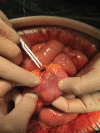Impact of Molecular Status on Cytoreductive Surgery for Peritoneal Metastases from Colorectal Cancer
- PMID: 37795471
- PMCID: PMC10547537
- DOI: 10.1055/s-0043-1767705
Impact of Molecular Status on Cytoreductive Surgery for Peritoneal Metastases from Colorectal Cancer
Abstract
Colorectal cancer peritoneal metastases (CRC-PM) are present in 5 to 15% of instances of CRC, and the overall survival (OS) of patients with CRC-PM is much lower than that of patients with other isolated metastatic locations. In recent years, the introduction of cytoreductive surgery (CRS) in conjunction with hyperthermic intraperitoneal chemotherapy has resulted in a significant improvement in CRC-PM patients' OS. Despite this, a significant proportion of CRS patients continue to suffer complications of grades III to V or even die during the perioperative period. Early diagnosis, optimization of patient selection criteria, and refining of individualized combination therapy are necessary for these patients. In this review, we evaluate studies examining the relationship between molecular status and CRS in CRC-PM. Our objective is to gain a comprehensive understanding of how the altered molecular status of CRC-PM impacts CRS, which could increase the likelihood of tailored therapy in the future.
Keywords: biomarkers; colorectal cancer; cytoreductive surgery; molecular status; peritoneal metastasis.
Thieme. All rights reserved.
Conflict of interest statement
Conflict of Interest None declared.
Figures
Similar articles
-
Recurrence and Survival Following Cytoreductive Surgery and Hyperthermic Intraperitoneal Chemotherapy for Synchronous and Metachronous Peritoneal Metastases of Colorectal Origin.Cancers (Basel). 2024 Feb 1;16(3):631. doi: 10.3390/cancers16030631. Cancers (Basel). 2024. PMID: 38339382 Free PMC article.
-
Cytoreduction and hyperthermic intraperitoneal chemotherapy in the treatment of peritoneal metastases from colorectal cancer in the Czech Republic in 2018.Klin Onkol. 2021 Summer;34(4):278-282. doi: 10.48095/ccko2021278. Klin Onkol. 2021. PMID: 34905928 English.
-
Management of colorectal cancer patients at high risk of peritoneal metastases.J BUON. 2015 May;20 Suppl 1:S71-9. J BUON. 2015. PMID: 26051336
-
Cytoreductive Surgery Combined with Hyperthermic Intraperitoneal Chemotherapy for Peritoneal Metastasis from Colorectal Cancer.Clin Colon Rectal Surg. 2020 Nov;33(6):372-376. doi: 10.1055/s-0040-1714242. Epub 2020 Sep 22. Clin Colon Rectal Surg. 2020. PMID: 33162842 Free PMC article. Review.
-
Cytoreductive Surgery and Hyperthermic Intraperitoneal Chemotherapy for Colorectal Peritoneal Metastases: A Summary of Key Clinical Trials.J Clin Med. 2022 Jun 14;11(12):3406. doi: 10.3390/jcm11123406. J Clin Med. 2022. PMID: 35743476 Free PMC article. Review.
Cited by
-
Comment on 'Cytoreductive surgery plus hyperthermic intraperitoneal chemotherapy versus R0 resection for resectable colorectal cancer with peritoneal metastases and low peritoneal cancer index scores: A collaborative observational study from Korea and Japan'.Int J Surg. 2024 Feb 1;110(2):643-644. doi: 10.1097/JS9.0000000000000932. Int J Surg. 2024. PMID: 38016290 Free PMC article. No abstract available.
References
-
- Sung H, Ferlay J, Siegel R L et al.Global Cancer Statistics 2020: GLOBOCAN estimates of incidence and mortality worldwide for 36 cancers in 185 countries. CA Cancer J Clin. 2021;71(03):209–249. - PubMed
-
- Bray F, Ferlay J, Soerjomataram I, Siegel R L, Torre L A, Jemal A. Global cancer statistics 2018: GLOBOCAN estimates of incidence and mortality worldwide for 36 cancers in 185 countries. CA Cancer J Clin. 2018;68(06):394–424. - PubMed
-
- Arnold M, Sierra M S, Laversanne M, Soerjomataram I, Jemal A, Bray F. Global patterns and trends in colorectal cancer incidence and mortality. Gut. 2017;66(04):683–691. - PubMed


